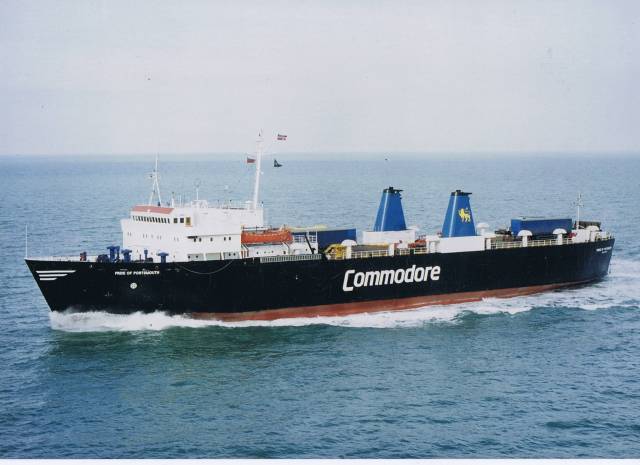#Condor70th - A UK-Channel Islands freight operator, Commodore Shipping reached a major milestone this year as the company celebrated seven decades of providing lifeline freight services from the mainland.
Now known as Condor Freight, Commodore first appeared on the horizon in 1947. Today the company moves 80% of all supplies taken to the Chanel Islands from the UK on services from Portsmouth International Port.
Commodore’s inaugural service began in September 1947 when its vessel, the ‘Red Commodore’ arrived in St Peter Port Harbour, in Guernsey on charter. She was soon joined by two other ships as the company expanded services to the UK and by 1950, had started to carry passengers between the Channel Islands. Changes embraced over the years include the move from cargo, to container and to the more recent roll-on roll-off (ro-ro) shipping plus the development of shore-side operations.
Condor Freight conveys supplies from the UK to the Channel Islands which includes temperature controlled products, heavy and out of gauge consignments (typically for construction projects), unaccompanied cars and passengers. Our services are maintained on a ‘just in time’ basis as extensive warehousing no longer exists on either Island. This requires close cooperation and liaison with longstanding logistics distributors and other clients to ensure supplies 24/7 and 365 days per year, most of which are transported overnight.
Current services from Portsmouth to Guernsey, Jersey and St Malo are sustained by the freight-only Commodore Goodwill and the mixed passenger and freight ship Commodore Clipper as previously reported on Afloat.ie. Together, these ships cover 3,000 nautical miles each week – the same distance as Portsmouth to New York.
Paul Luxon, Condor’s CEO, said the company’s longevity and success owed much to its willingness to adapt and embrace technology whilst remaining dedicated to the various needs of its customers. “By changing with the times, Commodore has been able to establish itself as a market leader in freight services which encompassed many other operations, including stevedoring, handling and distribution, all in response to the change in demand.”
“The development of ro-ro during the 1990s improved the speed and responsiveness of our services significantly so that these days, our teams can load and offload 80 x 13.6 metre trailers, each containing vital supplies for the Islands, in a fraction of the time it used to take. That’s the equivalent of more than 100 London buses.”
Mr Luxon confirmed that the dedication and loyalty of employees played a big part in the company’s development.
Kalvin Baugh, Ferry Port Manager of Portsmouth international Port, added: “'It's a mark of a good working relationship when milestones such as Commodore's 70th anniversary just seem to come along, so I am delighted we continue to forge an excellent partnership with Paul Luxon and his team and congratulate them on this great achievement.”






























































